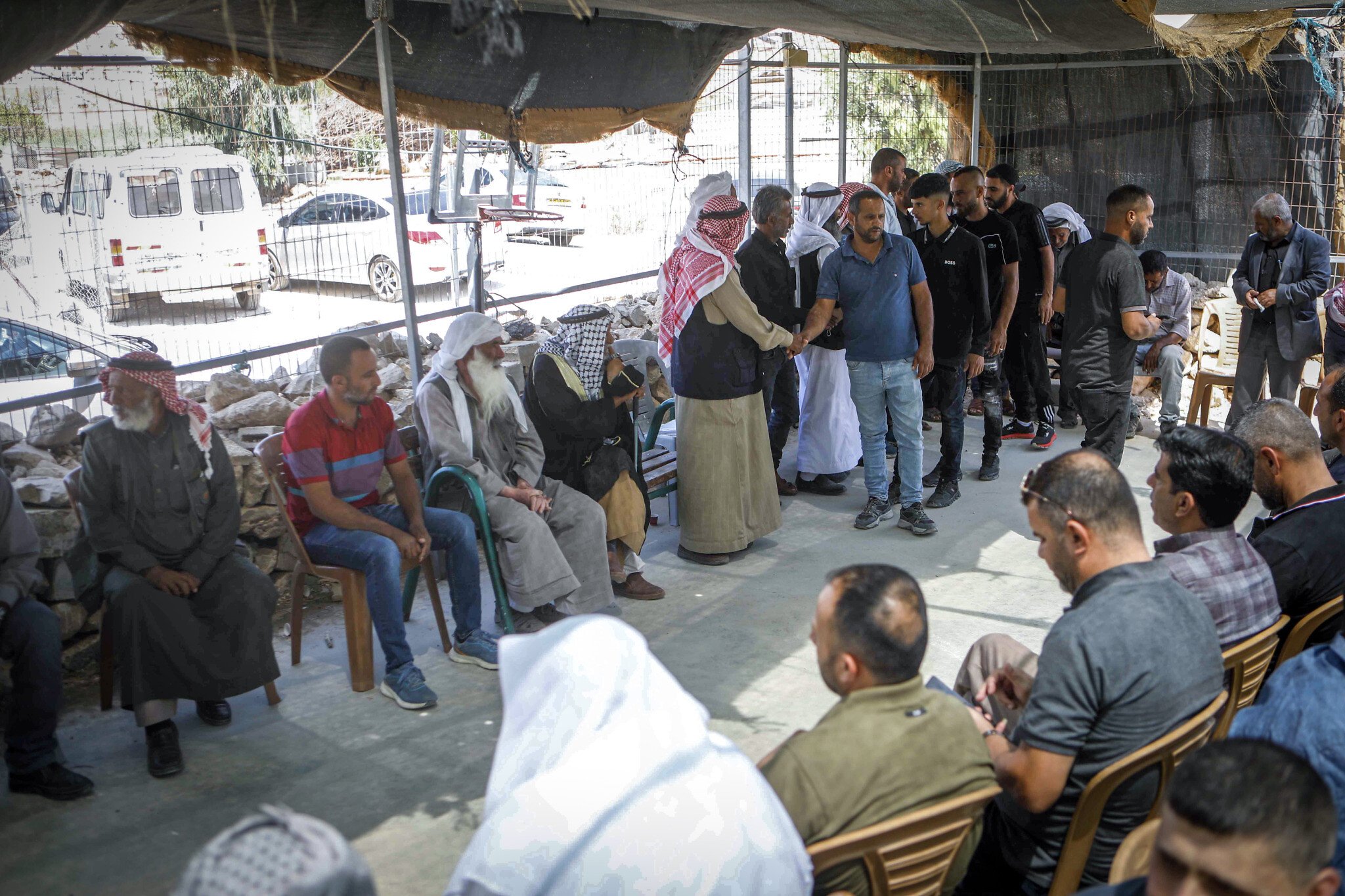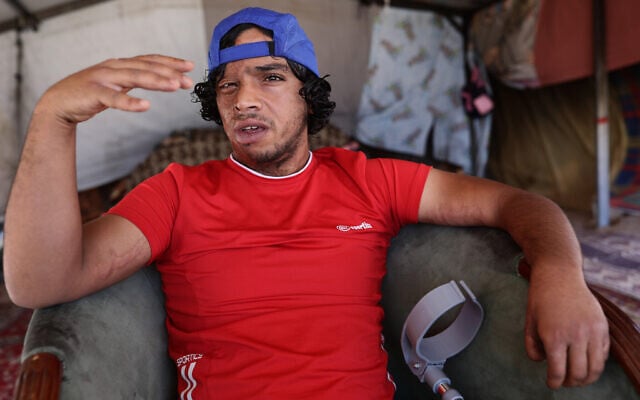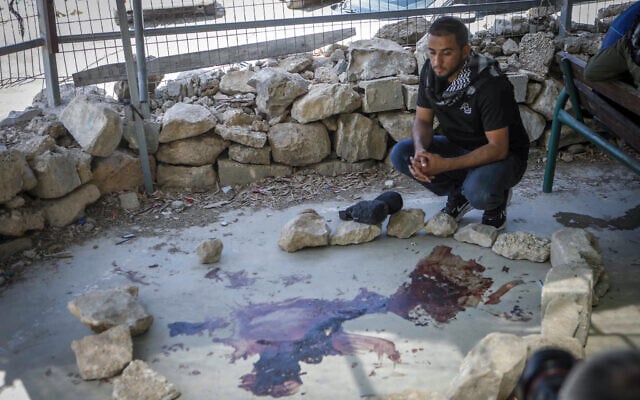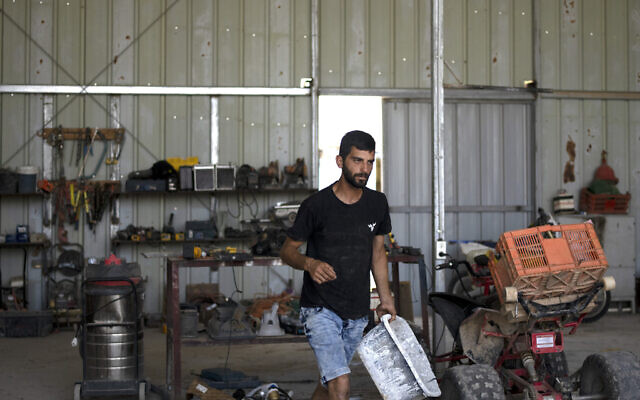



A military judge on Wednesday ordered that four Palestinians suspected of stone-throwing during an incident in which Palestinian activist Awdah Hathaleen was killed remain in custody for eight more days, after the suspected Israeli shooter was freed to house arrest a day earlier.
Hathaleen, who was featured in the Oscar-winning documentary “No Other Land” about Israeli home demolitions in the West Bank, was allegedly shot dead by Yinon Levi during an altercation near the southern West Bank village of Umm al-Kheir on Monday. Levi, who runs an illegal farming outpost in the area and is sanctioned by several Western countries, maintains that he acted in self-defense after being attacked by a group of Palestinians throwing rocks at him.
Wednesday’s legal proceedings highlighted the differences in treatment between settlers, who enjoy full Israeli civil rights, and Palestinians who are under Israeli military rule in the West Bank.
Israeli law requires suspects to be brought before a judge for a remand hearing within 24 hours, whereas Israeli military law allows authorities to wait up to 96 hours before bringing Palestinians before a judge.
Accordingly, Levi’s hearing was held at the Jerusalem Magistrate’s Court on Tuesday, while the Palestinians detained in the incident appeared before a judge for the first time on Wednesday. Levi’s house arrest expires on Friday, while the four Palestinians suspected of stone-throwing will remain behind bars until at least next Thursday.
Nasser Odeh, who is representing the four Palestinian suspects, told the judge at the Ofer Military Court in the West Bank that his clients were held with their hands and feet shackled for 13 hours at a military base after their arrest on Monday.
In requesting an additional remand extension against the four Palestinians, the Israel Police’s representative pointed to damage incurred to Levi’s bulldozer and vehicle, while arguing that Levi felt that his life was in danger when he fired his weapon.
Police were also reportedly refusing to release Hathaleen’s body, demanding his commit to a series of conditions before doing so.
Hathaleen’s body was initially held by Israeli authorities so that they could perform an autopsy amid the ongoing investigation into his killing.
The autopsy was completed at noon on Wednesday and by midnight police still had not returned Hathaleen’s remains.
Police have told the family that they will release the body only if it agrees to a series of conditions, including not erecting a mourning tent in the area of their home and capping the funeral at 15 people, Haaretz reported.
The IDF has issued a closed military zone order covering the entire village of Umm al-Kheir, claiming that the directive is to maintain public order. Locals say the army is punishing them and preventing the family from receiving condolence visits. The family tried to receive guests at a mourning tent on Tuesday but the IDF evicted visitors, using flash bombs to do so.
Hathaleen’s family is refusing to agree to the IDF’s conditions for releasing his body, Haaretz said.
Early Wednesday, the IDF arrested nine more Palestinians on suspicion of involvement in the incident in which Hathaleen was allegedly shot by Levi, who was formerly sanctioned by the US under the Biden administration, and is still sanctioned by Canada, the UK, and the European Union.
According to Peace Now, the head of the village was among those arrested.
Activists said the army entered Umm al-Kheir around 4:30 a.m. on Wednesday morning with two military jeeps to carry out the arrests.
Monday’s shooting occurred as pro-Palestinian activists attempted to block construction work being carried out by Levi close to the Carmel settlement, which is adjacent to Umm al-Kheir.
The Peace Now settlement watchdog said Hathaleen sent a WhatsApp message to activists in the area informing them that Levi tried to sever the village’s main water pipe. He then headed to the construction site with other activists to try to stop the work from being carried out.
In video footage from the scene of the confrontation, Levi can be seen holding a handgun and firing into the air, allegedly to distance the Palestinians.
Video filmed after the incident that was shared by pro-Palestinian activists appeared to show Levi speaking with army personnel and police officers while pointing to Umm al-Kheir residents inside the village. The police and IDF soldiers then entered the dwelling and arrested residents, apparently on Levi’s recommendation.
During Tuesday’s court hearing on extending Levi’s remand in custody, a police representative said “a large number of rioters” threw rocks at Levi and a minor operating the heavy construction vehicle “to harm them.”
Levi owns a construction company, together with his brother, by the name of Il Harei Yehudah. The Civil Administration, a department of the Defense Ministry, has subcontracted Il Harei Yehudah to carry out demolition work against illegal Palestinian structures in the South Hebron Hills.
In one incident in 2023, Levi destroyed three water cisterns in the Palestinian hamlet of Susyia with his bulldozer, while carrying out work for the Civil Administration forming a roadblock on the South Hebron Hills dwelling’s only access road.
Levi is also the founder of the illegal settlement outpost of Meitarim Farm, which is in the South Hebron Hills region.
Civil rights groups have cited Meitarim Farm in petitions to the High Court of Justice as a source of severe harassment and violence against local Palestinian shepherding communities, and alleged that Levi specifically has repeatedly conducted such violence.
This April, the government gifted Levi, together with 18 other founders and operators of illegal West Bank outposts, all-terrain vehicles.
Settlers from farming outposts have regularly been document using ATVs to harass Palestinian herders and their livestock, with Levi himself filmed doing so in the same region as Meitarim Farms.
Violence in the West Bank has spiked since the Hamas onslaught of October 7, 2023, which sparked the war in Gaza.
According to the Palestinian Authority health ministry, more than 950 West Bank Palestinians have been killed in that time. The IDF says the vast majority of them were gunmen killed in exchanges of fire, rioters who clashed with troops, or terrorists carrying out attacks.
The military says troops have arrested some 6,000 wanted Palestinians across the West Bank, including more than 2,350 affiliated with Hamas, since the October 7 onslaught.



